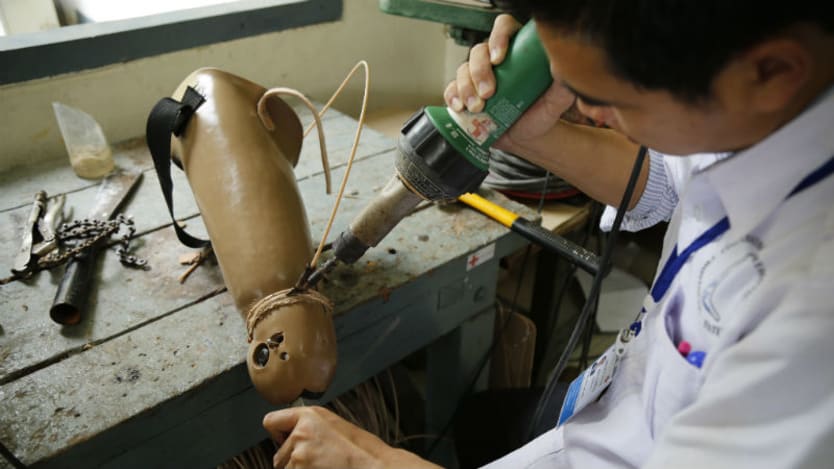
I have been using a prosthetic leg for 13 years, and in that time I have lost count of how many people have questioned my gait, stared at my leg, or crossed to the other side of the street to avoid me. Though these are the more extreme reactions, they capture the discomfort and misunderstanding that surround amputees who rely on prosthetics worldwide.
Although prosthetic limbs date back to 485-425 B.C., many people today lack awareness about the needs of prosthetic users, a reality that has contributed to the hindrance of prosthetic development and that has become a detriment to the lives of amputees worldwide.
Fortunately, in countries such as the United States, prosthetic limb development has advanced. Prosthetics are now being made with microprocessor joints, hands, and feet using bionic technology. While these improvements have helped many amputees in developed countries lead independent lives, much work still needs to be done to make sure that all amputees across the globe benefit fully from these advancements.
In low- and middle- income countries such as Rwanda, prosthetics are being made with recycled shoe strings and wooden materials, among others, in order to assemble a makeshift functional limb. Angelique Uwamahoro, one of the few prosthetics and orthotics professionals in Rwanda, expressed in an interview that “most of the materials such as polypropylene plastics used to make quality prosthetics are very expensive and so we often improvise to make devices that a client can afford.”
Enabling people, transforming lives with assistive products
The vast majority of people living with disabilities in LMICs do not have access to assistive products that could transform their lives. Devex explores some possible solutions. Read more from Devex’s Development Enabled series.
Alarmingly, more than 1 million annual limb amputations take place globally. I lost my right leg to Osteosarcoma. These numbers are bound to increase as accidents, diseases, and congenital deformities that lead to limb amputations continue to multiply. While this inconvenience is a global issue, amputees in LMICs are more affected because their governments take little to no effort in supporting them.
For example, my country of Rwanda has made tremendous strides in addressing primary health care and is seeing impressive improvements in health, yet progress in prosthetic development is practically nonexistent. According to the National Council for Persons with Disabilities in Rwanda, there are only 15 orthopedic clinics, many of which are located in remote areas, have limited resources and few external supporters. This lack of accessible and furnished facilities plays a major role in hindering an amputee’s independence.
Independence looks different to different amputees. To many, it is being able to walk your dog in shorts without pitiful stares, while to others, it may be going up and down stairs, hopping on a bus, or picking up a spoon with ease. We all have a role to play in supporting the amputee community. It shouldn’t take losing a limb to start learning about these devices and the people who use them.
Below are three main areas that must be improved to enhance the quality of life of amputees.
Advocacy is key
While society still has a long way to go in supporting prosthetic development and its users, we should acknowledge the progress that has already been made. With the increase in the number of amputees due to wars, infectious diseases, and other injuries, prosthetics are becoming more visible in everyday life. Unfortunately, it seems like tragedy is our best advocate.
Soon after the 2013 Boston Marathon Bombing, I noticed a significant decrease of people staring at me whenever I walked around my neighborhood in Boston, with my prosthetic leg showing. After the bombing, discussions and new research about prosthetics emerged. It is unfortunate that it took a tragedy that took the lives of three people, injured hundreds, and left 17 amputees to bring attention to prosthetic users and their needs.
We need to start advocating for the needs of amputees outside of tragedy. It is time the international development community took notice of this issue, which disproportionately affects amputees in LMICs. Like many developing countries, Rwanda barely has any representation of amputees in ministries and other high government offices, yet these are the people making decisions that affect our everyday lives. Very few schools in Rwanda are handicap accessible — so even for a person like me who has a functioning prosthetic leg, I still struggled to get around at school.
Research should be encouraged
In December of 2018, Rwanda hosted a Symposium on Rehabilitation and Mobility Device Services in Africa, which brought together prosthetic professionals and stakeholders from all over Africa. Among the various issues discussed was the lack of research on prosthetics, especially as it pertains to Africa. We need to build capacity and encourage research in LMICs — where according to an article published in the O&P EDGE Magazine, there are approximately 30 million people who need prosthetics.
A quick search on PubMed — a search engine for biomedical literature — found that there is nothing published on prosthetics in Rwanda. Research is a critical driver to any evolving field, and the fact that there is little to no data published about the prosthetics or amputee situation in countries that presumably have the highest numbers of amputees in the world, is a red flag.
Higher education institutions, research centers, and investors should develop measures to encourage research in prosthetics. Only 13 universities in the U.S. offer certification in prosthetics and orthotics, and only one, Massachusetts Institute of Technology, offers a Ph.D. focused in the field. If a credible change that benefits even the underprivileged is to happen, research must occur that spans the situation at a global level. In this way, researchers at MIT, John Hopkins, and others, will start developing prosthetics that an amputee can use anywhere in the world, regardless of the challenging environment in which they live.
Affordability is a major problem
With the advancement in technology, prosthetic limbs have reached a new level of quality and function. Prosthetics have moved from hooks and pegs to bionic arms, and legs made with microprocessor knees that allow amputees to walk up and down stairs with minimal struggle. Unfortunately, these advancements come with a hefty price tag.
They can only be accessed by the very rich. In developed countries such as the U.S., a lower extremity prosthesis ranges from $5,000.00-$50,000, while an upper extremity prosthesis costs between $3,000-$30,000. Add this to the physical therapy costs that go with learning how to use the device, the 3-5 year life span of most prosthetic limbs, and other medical issues associated with the amputation, and the cost totals to more than typical college tuition fees. While many institutions are striving to improve the lives of amputees through research and technology, the target market for these new discoveries will remain small if the price tags are not lowered. The chances of these technologies reaching clients in LMICs are minimal where many families survive on an income of only $300 per year.
I have a strong belief that if advocacy is encouraged and more research is carried out, then more opportunities that support amputees will emerge. Advances in technology have the potential to alter the future of prosthetic development and distribution in a way that benefits all amputees regardless of their economic status.








